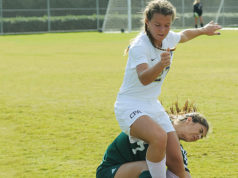As a rookie official, what are the very first laws to know? How can you translate that knowledge into judgment and action on the pitch?
Who and what: Laws 5 and 6
As referee, you are responsible for the match. Laws 5 and 6 are the blueprint for building the match on the pillars: safety, equality and enjoyment.
The referee controls the match in cooperation with assistant referees (ARs), Law 6. Assistants are vital, allowing the crew to function with a minimum of intrusion into what is the players’ game.
ARs assist in accordance with the referee’s prematch instructions, but the final decision is the referee’s. ARs indicate fouls or misconduct for which they have a clearer view.
ARs indicate when the ball has completely left the field, which team is entitled to a throw-in, corner kick or goalkick, when offside should be penalized and when the goalkeeper moves from the goalline before the ball is kicked at the taking of a penalty kick. They monitor substitutions and enter the field to enforce the required distance or to assist during massconfrontation situations.
The crew should arrive at the field no later than 30 minutes before kickoff to inspect the field, goals, nets, players’ equipment and match balls.
The referee has discretion to take action according to the Laws of the Game (LOTG) and the “spirit of the game.”
The referee’s decision on points of fact, including whether a goal was scored and the match’s result, are final.
The referee can only change a decision before the ensuing restart, which is why a caution or send-off during an advantage situation must be given before the restart and why the referee must double check with both assistants and, if applicable, the fourth official, before whistling for the kickoff after a goal. Once there has been a restart, nothing that happened before it can be changed. The referee also cannot change a decision after termination of the match or after signaling the end of any half and leaving the field.
The referee is timekeeper and scorekeeper, filing any required report.
The referee may allow play to continue where the offended team benefits and penalize the original violation where advantage does not materialize within two to three seconds. This is the anticipated advantage.
The referee may discipline from entry of the field for prematch inspection, through leaving the field at the end of the match.
The referee may expel team officials for irresponsible behavior in the technical area and take appropriate action for lesser misconduct.
The referee must act on the advice of other officials concerning incidents the referee has not seen, e.g. a player punches an opponent behind play.
The referee must indicate and supervise restarts.
The referee allows play to continue if a player is slightly injured, but stops play if a player is seriously injured. When uncertain of the severity, especially at the younger levels, play should be stopped immediately.
The referee prohibits entry of the field by unauthorized persons.
The referee immediately suspends play on hearing thunder or seeing lightning and resumes play only in accordance with the rules of the competition, state or local law.
Law 12: Misdemeanors, high crimes and capital offenses
A free kick may be given only for an offense or infringement committed while the ball is in play. A restart cannot be changed due to what occurs while the ball is out of play.
An offense involving handling or contact with an opponent is penalized by a direct free kick or penalty kick.
The severity of the following fouls is judged as: careless (a simple foul), reckless (cautionable because committed with disregard for danger to, or consequences for, the opponent) or with excessive force (a send-off where necessary force is exceeded and opponent’s safety is endangered): tripping or attempt, kicking or attempt, striking or attempt, charging, jumping at, pushing, tackling or challenging.
For handling, holding, impeding with contact or spitting at, mere commission of the foul is sufficient.
Indirect-free-kick offenses involve no contact: dangerous play (must endanger opponent or offender or prevent opponent’s playing the ball due to fear of injury to self or offender); impeding without contact; preventing goalkeeper’s release of ball; kicking ball (or attempt) when goalkeeper attempts to release it; any offense not mentioned in LOTG where play is stopped to caution or send-off; goalkeeper controls ball for more than six seconds (verbally warn before blowing the whistle); goalkeeper retouches ball with the hand after releasing it to play and before it is touched by another player; goalkeeper touches with the hand a ball deliberately kicked by a teammate or thrown directly to goalkeeper by a teammate.
In FIFA, only a player, substitute or substituted player, may be carded. In NFHS and NCAA, a player, coach or team personnel can be carded.
Cautionable offenses: delaying the restart, dissent by word or action, entering, re-entering or leaving field of play without permission, except during normal course of play; failure to respect the required distance; persistent infringement of the LOTG (e.g., player commits several fouls within a short time, against the same opponent or several fouls of the same kind), unsporting behavior (e.g., reckless jumping at).
Mandatory cautions: feigning injury, foul simulation, changing places with goalkeeper during play or without referee’s permission, reckless direct free- kick offense, fouling or handling to interfere with or stop a promising attack; handling (successfully or not) to score a goal, unsuccessful handling to prevent a goal, showing lack of respect for the game, verbal distraction of opponent during play or at a restart and improper goal celebration, such as pulling jersey off or over the head.
Capital offenses: Denial of a goal or obvious goal-scoring opportunity by handling; denying an obvious goal-scoring opportunity to opponent moving toward goal unless committed within the penalty area and penalty kick is awarded; offense is holding, pulling or pushing; offender does not attempt to play the ball or has no possibility of playing it or offense itself is punishable by a red card, such as serious foul play or violent conduct. The referee must consider distance between offense and goal, general direction of play, likelihood of keeping or gaining possession of the ball, and location and number of defenders.
Serious foul play: a tackle or challenge which endangers safety of an opponent or involves excessive force or brutality, including a lunge from any direction with one or both legs and which involves excessive force or endangers opponent’s safety.
Violent conduct: use or attempted use of excessive force or brutality against an opponent when not challenging for the ball, or against any person, regardless of whether contact was made. A player, when not challenging for the ball, who strikes an opponent or any person on the head or face with a hand or arm, is guilty of violent conduct, unless force used was negligible.
That should make some sense of it.
Note: This article is archival in nature. Rules, interpretations, mechanics, philosophies and other information may or may not be correct for the current year.
This article is the copyright of ©Referee Enterprises, Inc., and may not be republished in whole or in part online, in print or in any capacity without expressed written permission from Referee. The article is made available for educational use by individuals.



















